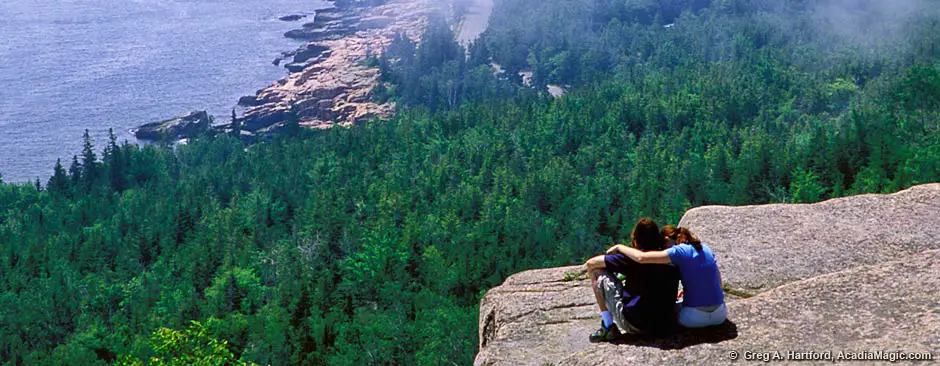
Hiking Hints & Safety
Hiking is a great way to stay in shape plus it allows us to experience Acadia National Park in a way that is up close and personal. Your experience will greatly be enhanced if you take some time to become familiar with the following hiking hints and safety suggestions. Follow as many as you can. For additional information, you may call the National Park Service at the Headquarters:.
- Whenever possible, try to hike with at least one other person. Besides providing emotional support along the trails, it also provides backup should something unforeseen happens.
- Carry water, food, a flashlight, trail map, and a windbreaker with you.
Note: When selecting food, consider that hiking can burn as much as 300 calories per hour. If your hike will take more than 2 hours, be sure to have foods that do not require refrigeration such as peanut butter on whole-grain bread, nuts, dried fruits, dry whole grain cereal, carrots, celery, apples, bananas, raisins, and energy bars.
- Take some kind of medical safety kit with you. If you or anyone else in your party has allergies such as for bee stings, be sure to have the necessary kit. Don't assume - ask.
- Wear sturdy hiking shoes or boots that have lug soles and ankle support for most hiking trails. Sneakers or walking shoes should only be used on carriage roads or the more easy shore trails.
- Know the difficulty level of the hiking trail and your physical abilities/limitations.
- Follow blue trail blazes and use a map. Do not modify cairns or build new ones. Changes to trail markers may endanger other hikers.
- Dress for variable weather and let someone know where you will be.
- Stay on the hiking trail. Stepping off the trails can trample fragile plant life and cause erosion.
- Step carefully on summits. Rare sub alpine plant species grow on many mountain tops. Step on rocks when possible.
- Do not start fires on the hiking trails and do not hike at night.
- Biking is not allowed on any of the hiking trails in Acadia National Park.
- Bury human waste in areas without toilets.
- Carry out all trash, including toilet paper and cigarette butts.
- Pets must be restrained on a leash.
- Swimming, wading, and pets are prohibited in public water supplies. Please respect posted regulations at lakes and ponds.
- Do not feed or disturb wildlife.
- Check for ticks after hiking.
Additional Resources for Information
Follow the Guidelines!
 Virtually nothing is more important when going hiking in Acadia National Park than to plan ahead and be familiar with the rules and guidelines of good hiking safety. Follow as many as is possible and check the projected weather conditions right up to, and during your hike whenever possible. Be aware that, due to the many mountains and valleys within Acadia National Park, cell phones and GPS units often will not work, even when on the water’s edge in places. Therefore, make sure to have a printed map and a compass with you. As you likely know, this is a gorgeous place just made for exploration. Enjoy your time here!
Virtually nothing is more important when going hiking in Acadia National Park than to plan ahead and be familiar with the rules and guidelines of good hiking safety. Follow as many as is possible and check the projected weather conditions right up to, and during your hike whenever possible. Be aware that, due to the many mountains and valleys within Acadia National Park, cell phones and GPS units often will not work, even when on the water’s edge in places. Therefore, make sure to have a printed map and a compass with you. As you likely know, this is a gorgeous place just made for exploration. Enjoy your time here!